What Is Diabesity?
Diabesity (Obesity + Diabetes)
What You Need To Know If Anyone You Care About Is A Pre-diabetes Or Diabetes And Suffers From Weight Problems
Diabesity is the term for diabetes occurring in the context of obesity which is a newly evolving epidemic.
The prevalence of both type 2 diabetes and obesity has had a rapid increase worldwide during the last century, mainly attributed to changes in human behaviour, especially sedentary lifestyle and dissemination of the western diet, in addition to genetic susceptibility. Both diabetes and obesity are also integral components of metabolic syndrome.
The global prevalence of diabetes in 2010 was 284 million people worldwide constituting around 6.4% of the world population. The projections for 2030 show the prevalence to reach 439 million individuals comprising ~7.7% of the world population.
The burden of diabetes on the world economy has been rising steadily in the last decade to reach $376 billion in 2010 and is expected to reach $490 billion in 2030. Diabesity represents a substantial economic burden as reflected by diabetes and obesity consuming 14 and 5.7% of the USA’s total health expenditure, respectively, representing the highest known expenditure on diabesity worldwide.
The health impact of diabesity is substantial to include long-term diabetic complications, reduction in health-related functioning, reduction of quality of life and reduced myocardial infarction, cerebrovascular stroke and end-stage renal disease.
The obesity epidemic is suggested to be due to the complex interaction of both environmental factors and genes. It has been suggested that there are genes favouring storage of fat, which became maladaptive in our modern environment minimizing physical activity and favouring high-energy intake.
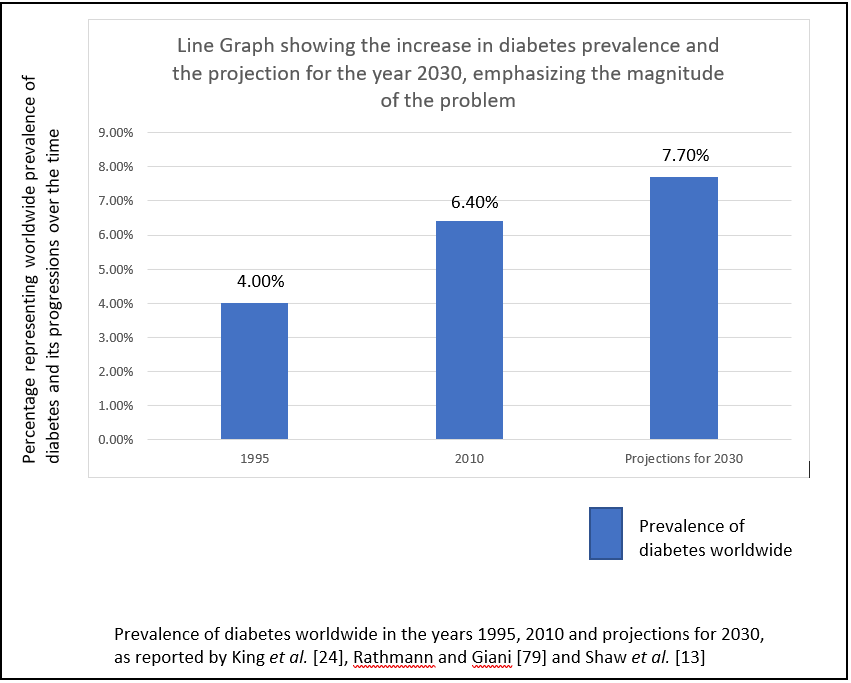
What Is Obesity?
Obesity is the abnormal or excess accumulation of fat in the body that causes health related issues or impairment of their health.
What Is Considered Obese In Asia?
For Asian Americans, lower BMI values than in non-Asian populations may indicate overweight and obesity. Many have suggested that for Asian Americans, a BMI of less than 18.5 is underweight, a BMI from 18.5 to less than 23.0 is healthy, while a BMI between 23.0 to 27.5 is overweight, and a BMI above 27.5 is obese.
How To Calculate Body Mass Index (BMI)?
Body Mass Index is a simple calculation using a person’s height and weight. The formula is BMI = kg/m2 where kg is a person’s weight in kilograms and m2 is their height in metres squared

Obesity In Malaysia
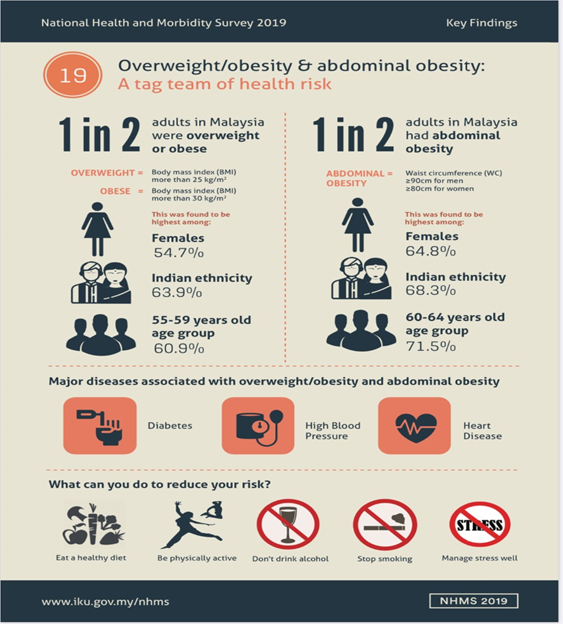
Health Impact Of Obesity
Obesity is associated with increased risk for numerous chronic diseases including diabetes, hypertension, heart disease and stroke. Obesity is also associated with various diseases including gastroesophageal reflux disease, colorectal polyps, colon cancer and liver diseases such as non-alcoholic fatty liver disease, cirrhosis and hepatocellular carcinoma.
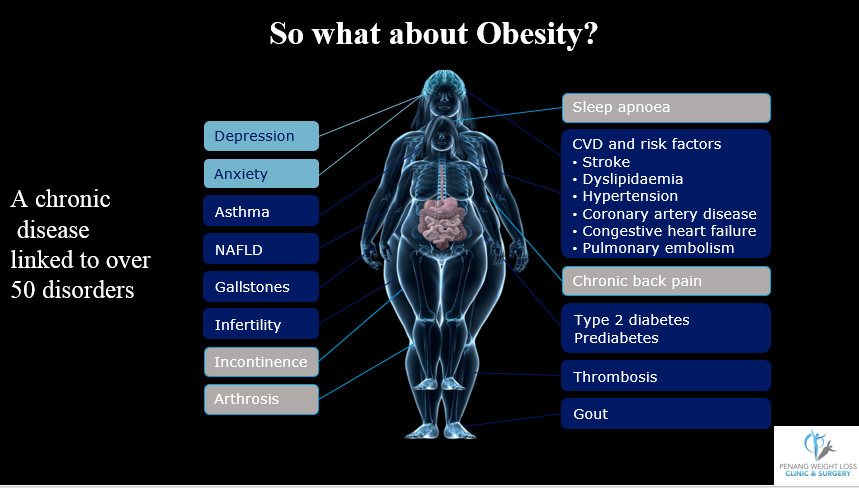
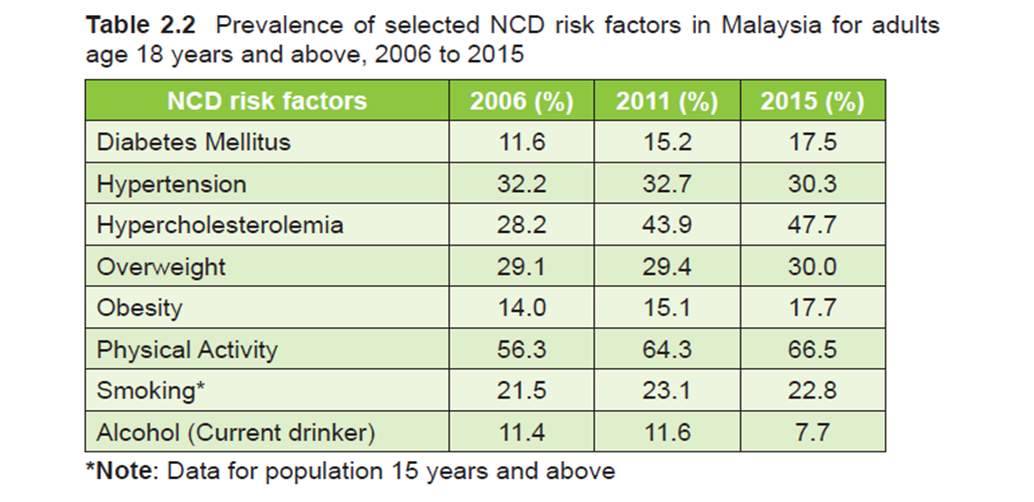
How Can I Prevent Or Delay Diabesity?
If you are at risk for diabesity, you may be able to prevent or delay getting it. Most of the things that you need to do involve having a healthier lifestyle. Therefore, if you make these changes, you will get other health benefits as well. You may lower your risk of other diseases, and you will probably feel better and have more energy. The changes are:
- Losing weight and keeping it off.
Weight control is an important part of diabesity prevention. You may be able to prevent or delay diabetes by losing 5 to 10% of your current weight. For example, if you weigh 100kg, your goal would be to lose between 5 to 10kg. And once you lose the weight, it is important that you don't gain it back.
- Following a healthy eating plan.
It is important to reduce the number of calories you eat and drink each day, so you can lose weight and keep it off. To do that, your diet should include smaller portions and less fat and sugar. You should also eat a variety of foods from each food group, including plenty of whole grains, fruits, and vegetables. It's also a good idea to limit red meat, and avoid processed meats.
- Get regular exercise.
Exercise has many health benefits, including helping you to lose weight and lower your blood sugar levels. These both lower your risk of type 2 diabetes. Try to get at least 30 minutes of physical activity 5 days a week. If you have not been active, talk with your health care professional to figure out which types of exercise are best for you. You can start slowly and work up to your goal.
Don't smoke.
Smoking can contribute to insulin resistance, which can lead to type 2 diabetes. If you already smoke, try to quit.
Talk to us to see whether there is anything else you can do to delay or to prevent type 2 diabetes. If you are at high risk, we will help you in screening for diabesity and offer you further treatment.
How Obesity Causes Type 2 Diabetes Mellitus (T2DM)
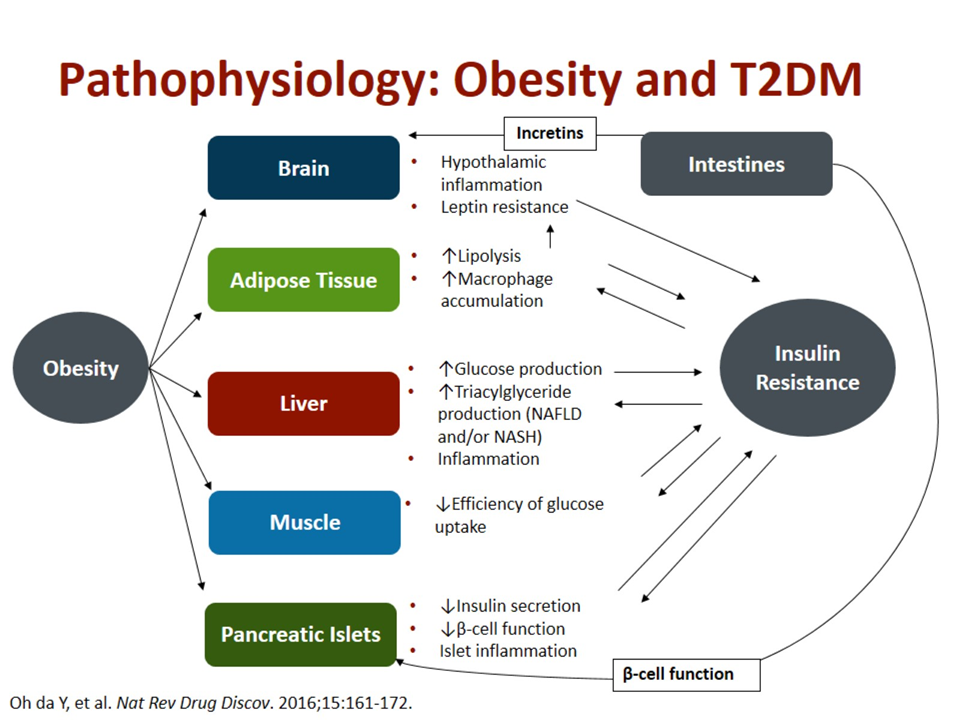
Challenges And Opportunities
The best way to contain this epidemic is to screen for early detection, prevention and early management of obesity, especially in younger individuals, before the development of type 2 diabetes mellitus. It was suggested that supplementation with micronutrients such as vitamin D and vitamin E could attenuate the innate immunity.
It is thus recommended that all individuals 30 years of age or older with risk factors should be screened annually for type 2 diabetes mellitus and obesity. Risk factors include family history, hypertension, obesity, sedentary lifestyle, cardiovascular disease and hyperlipidaemia. Screening should be done for high-risk individuals using fasting plasma glucose (FPG).
As for obesity, there is mounting evidence that the BMI (weight in kilogram/ height in meter squared) is reliable and valid for detecting obese and overweight individuals with increased risk for morbidity and mortality.
Conclusion
It is evident that diabesity has already become a world-wide epidemic with a significant health and economic burden affecting both developed and developing countries.
Hence, it is imperative to take step towards a healthy lifestyle in order to curb this epidemic.















